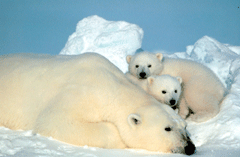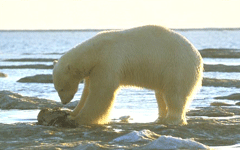Growling Over Polar Bears
Air Date: Week of January 11, 2008

Polar bear and cubs (Photo: Steve Amstrup/U.S. Fish and Wildlife Service)
The U.S. Fish and Wildlife Service has failed to meet a federal deadline to determine whether to protect the polar bear under the Endangered Species Act. Some environmental groups say the Bush administration is ignoring the effects of global warming on the animals. Host Steve Curwood talks with Bill Snape, Senior Counsel for the Center for Biological Diversity, about the delay.
Transcript
CURWOOD: From the Jennifer and Ted Stanley Studios in Somerville, Massachusetts—this is Living on Earth. I’m Steve Curwood. As the habitat of the polar bear disappears with arctic sea-ice, this great beast has become an icon of the consequences of global warming.
And though the polar bear may be in danger, the U.S. Fish and Wildlife Service recently missed a deadline to decide whether the polar bear needs the protection of the Endangered Species Act. The agency says it needs another month to consider research from the U.S. Geological Survey on polar bears and sea ice, as well as a flood of public comments in support of the listing.
That delay has prompted environmental groups to start legal action to force the government to make a decision. Joining me now is Bill Snape, he’s chief counsel with the Center for Biological Diversity—welcome to Living on Earth.
SNAPE: Hello!
CURWOOD: So, as I understand it, your organization has filed a notice of intent to sue.

Bill Snape, Senior Council at the Center for Biological Diversity (Courtesy of Bill Snape)
CURWOOD: ‘Bogus?’ That’s a strong word.
SNAPE: Well, this is an agency that has had well over a year to take a look at their own listing proposal. The original petition to list the polar bear was submitted in 2005. And the report upon which they are relying now in claiming that it was late was submitted in September. So, we think waiting even a month for this species is too long, as its habitat does continue to melt.
And I think, perhaps most importantly, you must look at this delay in the overall context of Bush Interior Department’s Endangered Species Act record. This is an agency that has not listed any species in over one year and one half. So the polar bear delay must be viewed in that context and it frankly makes us very suspicious.
CURWOOD: Now the Minerals Management Service of the Interior Department has announced that it will hold a sale on oil and gas leases in the Chuckchi Sea, and that’s an area within polar bear habitat within in the next few weeks. And that’s before the Fish and Wildlife Service will make a decision on listing the polar bear. To what extent did that affect your decision to file this notice of intent to sue now?

Polar bear and cubs (Photo: Steve Amstrup/U.S. Fish and Wildlife Service)
So, the fact that on the one hand you’ve got a polar bear decision that is late under the Endangered Species Act, and on the other hand they manage to get the lease sale done quite on time—in fact, early—when you add that up it’s the same old Bush Administration, the same old anti-environmental policies. And that spells bad news for the polar bear.
CURWOOD: Now, we spoke with Valerie Fellows. She’s a spokesperson for the Fish and Wildlife Service and she told us that the polar bears will have plenty of protections, even if the leases are used for oil and gas drilling. Let’s hear her now:
FELLOWS: With or without an endangered species listing, MMS will still have to comply with a NEPA analysis—a National Environmental Policy Act analysis. And comply with the Marine Mammal Protection Act, which already protects polar bears.
CURWOOD: So she’s saying that the Department of Interior must comply with the Marine Mammals Act, which already protects polar bears—ESA listing or not. What’s your response?
SNAPE: Well, as a lawyer my response is twofold: Under the National Environmental Policy Act, one of the two statutes that she mentioned, you must remember that that is a procedural statute. As long as the agency analysis is honest and forthright, you can say ‘we’re going to destroy the habitat,’ put it in an environmental impact statement, and that’s the end of the ball game under NEPA. So, NEPA’s not the answer to protect the polar bear here.
The Marine Mammal Protection Act does offer some modicum of protection for the polar bear, but it pales in comparison to what the Endangered Species Act does. So really that is a weak answer at its very best.

A hungry polar bear. (Courtesy of DOI)
SNAPE: Well the Endangered Species Act is a tool in the kit to protect the polar bear and to deal with global warming. It is absolutely not the only tool. I don’t see Governor Palin out in front leading the charge for Congress to pass emissions controls, which obviously would help global warming. And so to the extent that imperiled species are declining because of global warming—the Endangered Species Act is a solution.
My prediction is: eventually the Bush Administration or a subsequent administration is going to have to list the polar bear. The science is just overwhelming. And I sort of predict that not all oil and gas leases are going to stop the next day. So again to repeat—the Endangered Species Act is one of many tools to deal with global warming. It is not the only tool. And we would love to see Governor Palin, we’d love to see Secretary Kempthorne, we’d love to see the president of the United States endorsing some legislation to deal with global warming head on. That would be great news.
CURWOOD: If you are successful, would one end up saying that the polar bear would be much like the spotted owl—the little bird that stood up to prevent the clear cutting of the northwest forests?
SNAPE: Yes. The polar bear is becoming a symbol for what is happening as a result of global warming. And the arctic ecosystem of which the polar bear is a part is suffering the impacts of global warming first—quite early. The science is very clear on that. And I have two young boys. I am fearful, based on the science I have read, that polar bears will not be seen in the wild when they are my age. And that is to me a truly frightening thought. So yes—the polar bear is becoming the symbol for what is wrong with global warming but I hope it becomes the symbol of what can be done.
CURWOOD: Bill Snape is senior counsel for the Center for Biological Diversity. Thank you so much, sir.
SNAPE: Thank you.
Links
Statement for Polar Bear Decision, U.S. Fish and Wildlife Service January 7, 2008
Living on Earth wants to hear from you!
Living on Earth
62 Calef Highway, Suite 212
Lee, NH 03861
Telephone: 617-287-4121
E-mail: comments@loe.org
Newsletter [Click here]
Donate to Living on Earth!
Living on Earth is an independent media program and relies entirely on contributions from listeners and institutions supporting public service. Please donate now to preserve an independent environmental voice.
NewsletterLiving on Earth offers a weekly delivery of the show's rundown to your mailbox. Sign up for our newsletter today!
 Sailors For The Sea: Be the change you want to sea.
Sailors For The Sea: Be the change you want to sea.
 The Grantham Foundation for the Protection of the Environment: Committed to protecting and improving the health of the global environment.
The Grantham Foundation for the Protection of the Environment: Committed to protecting and improving the health of the global environment.
 Contribute to Living on Earth and receive, as our gift to you, an archival print of one of Mark Seth Lender's extraordinary wildlife photographs. Follow the link to see Mark's current collection of photographs.
Contribute to Living on Earth and receive, as our gift to you, an archival print of one of Mark Seth Lender's extraordinary wildlife photographs. Follow the link to see Mark's current collection of photographs.
 Buy a signed copy of Mark Seth Lender's book Smeagull the Seagull & support Living on Earth
Buy a signed copy of Mark Seth Lender's book Smeagull the Seagull & support Living on Earth

